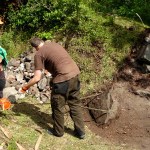archeology
Medieval walls are usually shell walls, where you construct an inner and outer shell of finely fitted masonry while filling the space between them with a jumble of smaller stones and mortar. Usually the facing stones don't project much into the core. When the wall is allowed to erode, once the cap stones have fallen off, the facing starts to peel from the core one ashlar or brick at a time from the top down. Before the resulting rubble layer's top (rising) reaches the level of the wall's eroding top (descending), halting erosion, you'll see a ruinous wall that is thick and smooth-faced in its…
Stensö castle, trench C, the part along the perimeter wall. Note the ashlar.
Drove down to Vikbolandet on Sunday night with my excellent colleague Ethan Aines from Stanford, and we were met at expedition HQ by seven of my Umeå students from last autumn semester. Very pleased to see them again! They've just finished their second term and several are scheduled to go on to the third. So I'll be seeing them in the halls in September when I take on my second batch of Umeå freshmen, and if I'm lucky I'll get to supervise a few of them for their BA theses. Everyone's being charming and nobody…
We picked up a used copy of Charles Mann's pop-archeology book 1491: New Revelations of the Americas Before Columbus a while back. I didn't read it at the time, because I was a little afraid that it would be rather polemical in what I think of as the Neil Young mode-- wildly overstating the awesomeness of pre-Columbian cultures, and exaggerating the evil of the European invaders (Neil's recorded some great stuff, but the lyrics to "Cortez the Killer" are pretty dopey). It came up several times recently in discussions elsewhere, though, and seemed like it would make a nice break from the…
A nice short piece on "The Prehistory of Stress" by Matt Ford at Ars Technica (newly designed site worth checking out).
I have heard people say, on multiple occasions, that they think stress is a modern, Western phenomenon. While the psychological phenomenon known as stress has only had a formal name for just over 80 years, knowing when it was first suffered by our ancestors is a daunting task. Was life really better in the past? Is stress an entirely modern phenomenon?
Using modern forensic technology and a decidedly modern understanding of biochemistry, researchers from The…

